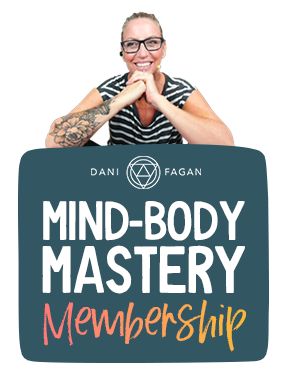6
Rewire your mindset from fear to condifence
Unlearning old survival patterns and stress responses
Quite possibly the most important overall element of this whole process. Having the right mindset, rewiring your brain and engrained patterns alone can give you the tools necessary to never suffer from TMS or any of its annoying chronic counterparts ever again. Some people recover just from reading Sarno’s books, and some just from changing the way they think about their symptoms. Alas, not me and not most people I work with. Mindset work did give me the final lightbulb moments I needed to make it towards the finish line of my recovery.
I learnt a lot about mindset from Nicole’s podcast, particularly about turning fear into love and hatred into compassion. She teaches that an essential part of recovery is to practice complete and utter patience and kindness for yourself. This means no comparing your healing journey to other people’s, no clock watching, no crazy expectations, no hating yourself for being broken and pathetic and plenty of loving self-care at all times.
Switching our mindset from fearful and frustrated to compassionate and curious is no easy feat, especially when we're dealing with copious amounts of stressful hypervigilance of chronic symptoms.
This is a great conversation on mindset and how we approach our symptoms - check out the interview of Dr Chatterjee with Dr Schubiner on chronic pain and why these factors are so important to understand. It's a brilliant episode on Dr Chaterjee's podcast Feel Better Live More.
How to overcome the fear of symptoms and flare-ups is really important too as fear can keep us stuck in chronic suffering.
This recovery process is different for everyone, so whatever happens, please be patient and loving towards yourself as you move through it - it's hard enough as it is without the added pressures you can put on yourself.
Starve your symptoms of negative attention
"Starve it of attention"? HA! I understand that initial reaction.
When symptoms are persistently demanding your awareness, the idea of not paying them any attention can feel impossible, even counterintuitive. However, it's not about outright ignoring your experience, but rather about strategically refocusing your attention and transforming your fear into confidence and a sense of indifference towards the symptoms' power.
You can still acknowledge the presence of symptoms from a place of safety, observing it with a curious detachment, as if viewing it through a window and considering its potential message – without allowing it to consume your time, anxiety, attention, fear, and overall focus.
Alan Gordon's Pain Reprocessing Therapy
Alan Gordon - mind-body and chronic pain expert, author, podcaster and psychotherapist and founder of The Pain Psychology Center is one of the great teachers in this space who focuses on transforming your relationship to fear of your symptoms. In his book The Way Out he simply explains how our fear is perpetuating our symptoms, and how to gently reprogram our minds to stop obsessing and fixating.
He also has a fabulous podcast, Tell Me About Your Pain.
One of the clearest paths to eliminating your symptoms is to take away the their power by overcoming your preoccupation with them. ~ Alan Gordon LCSW
Don’t hate, your brain is just protecting you
Ultimately your brain is just trying to keep you safe, help you and protect you by sounding off an alarm of sorts.
What you might find, the more you progress with this work, and certainly if you work with me, is that eventually, you start to thank symptoms for their messages and be kind to them. You could say I even love them now it instead of kicking and screaming in frustration at what they did to me. That change of heart is wildly effective in propelling your recovery forwards. Befriending your symptoms, as wild as that sounds, demolishes the threat response associated with them - which is exactly what we want.
Switch fear to love
A BIG TIP: A real pivotal moment for me was when I figured out how to switch my feeling of fear and frustration into safety and love. Every time I felt angry and scared that my pain was firing and ruining my life, I would quickly switch that to an image of my younger self:
I imagined little Dani hurting and holding her arms out for help, begging me to listen and that one thing made my fear turn to love really quickly. I practised that every time my pain became frustrating and my pain levels changed dramatically.
This approach has worked for many other people that I coach. It's a real game-changer, a simple visualisation that can literally switch off symptoms within the same day they occur.
Surrender and accept
Changing the way you think about your chronic symptoms and how you treat them can create epic changes to your suffering. Dan Buglio with Pain-Free You has lots of great videos on this topic, and he can switch your thinking from desperately desperate, to hopefully hopeful, very quickly. But it can take time and constant reminders to understand this. It can be hard to not constantly obsess about your symptoms and not be pissed off when it's still there.
I talked about mindset a little in the GET MOVING section, where you teach your brain to believe it's OK now and safe to do physical things again. Mindset matters most to your brain because what you think - you believe.
Through all this learning and working and addressing your emotions, there will come a time where you might need to just STOP.
Let go of the reigns of your fearful chaotic healing journey, stop fighting your body and surrender. Accept what it is, do your best to feel your feelings and soothe yourself, but let go of the fearful obsession. Let go of that stuck situation of constantly trying to fix yourself and switch your focus on what’s thriving in your life, things you can control and find joy in. Focus on your family, your hobbies, your dreams, your joys. Get on with your life as best you can, and the healing will happen as a result.
The importance of self-compassion
As the saying goes, "you can't heal a body you hate". Many of us arrive here at this work with a very complex relationship with ourselves. People-pleasers that put themselves last, with deeply engrained internal narratives that are hard to shake.
Learning to trust and accept yourself along this journey is key to long-term success. The brain interprets negative self-talk and pressure as a threat and keeps the nervous system firing danger signals. The softer and more patient we can be with ourselves, the better.
Where to next?
Everything I wish I had known at the beginning of my healing journey including pitfalls to avoid, summarised in one place to help you stay on track!
Click here to continue to the next section (What to expect while healing mind-body conditions)






